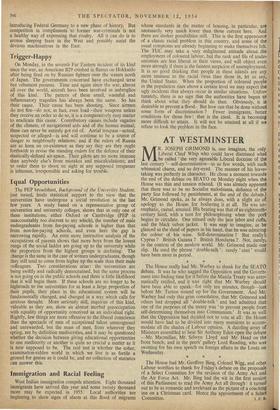Equal Opportunities
The PEP broadsheet, Background of the University Student, just issued, lends statistical support to the view that the universities have undergone a social revolution in the last few years. A study based on a representative group of universities and university colleges, shows that at only one of these institutions, either Oxford or Cambridge (PEP is unaccountably too discreet to say which), the number of male undergraduates from fee-paying schools is higher than that from non-fee-paying schools, and even here the gap is narrowing rapidly. An even more instructive analysis of the occupations of parents shows that more boys from the lowest rungs of the social ladder are going up to the university while the proportion from the highest groups is declining. The change is the same in the case of women undergraduates, though they still tend to come from higher up the scale than their male colleagues. Two considerations arise: the universities are being swiftly and radically democratised, but the same process is not going on in the public schools and there is little likelihood that it will begin there. If these schools are no longer to be highroads to the universities for at least a large proportion of _their pupils, their place in the educational system will be fundamentally changed, and changed in a way which calls for anxious thought. More seriously still, inquiries of this kind, valuable as they are, show an almost morbid preoccupation with equality of opportunity conceived as an individual right. Rightly, few things are more offensive to the liberal conscience than the spectacle of men of exceptional talent unrecognised and unrewarded, but the mass of men, from wherever they spring, are by definition mediocrities, and it may be questioned whether the decision between giving educational opportunities to one mediocrity or another is quite so crucial a matter as it is now supposed to be. The real test is whether the sober, examination-ridden world in which we live is as fertile a ground for genius as it could be, and no collection of statistics can answer this.


































 Previous page
Previous page